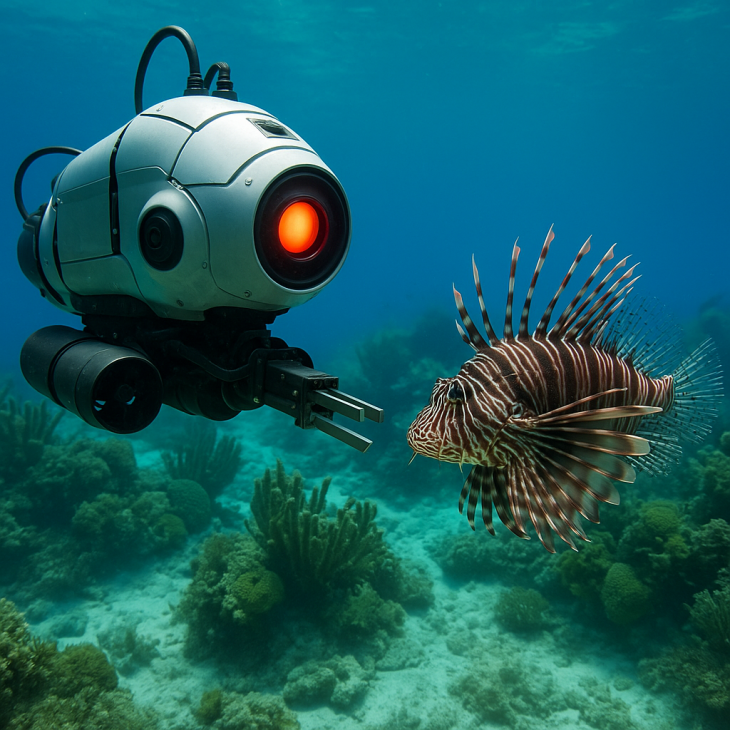
By Caribbean World Magazine
The Future of Conservation Has Arrived—And It Looks Like a Sci-Fi Assassin
It doesn’t sleep.
It doesn’t eat.
It just hunts lionfish.
In a technological twist that feels ripped from a sci-fi thriller, a groundbreaking underwater robot is now patrolling the crystal-clear waters of the Caribbean Sea—on a mission to stop one of the region’s deadliest environmental threats: the invasive lionfish.
But don’t panic—it’s not after people. It’s here to save the reef.
Meet “The Lionfish Terminator”—An AI Robot Designed to Protect Coral Reefs
Nicknamed the Lionfish Terminator, this sleek, autonomous submersible is part robot, part marine guardian. Equipped with artificial intelligence, sonar mapping, and an electric stunning mechanism, it patrols the seafloor searching for one target: Pterois, aka lionfish.
Native to the Indo-Pacific, lionfish have exploded across Atlantic and Caribbean ecosystems in recent years, decimating native species and coral reef habitats. With no natural predators in these waters, their population has skyrocketed—posing a severe threat to marine biodiversity.
How the Robot Works
Unlike traditional divers or spearfishing efforts, this high-tech robot brings precision and scale to the problem. Here’s how it works:
-
AI Detection: The robot uses advanced computer vision to identify lionfish instantly.
-
Electric Stun: It delivers a targeted, non-lethal shock that stuns the fish without harming surrounding marine life.
-
Automated Collection: Once immobilized, the fish are collected and stored for removal.
From Predator to Platter: The Lionfish Culinary Twist
Here’s where things get delicious: once removed, lionfish are processed and sold as high-end seafood in local markets and restaurants. Chefs praise its mild, buttery flavor, while conservationists call it “the only fish you should feel good about overfishing.”
This approach turns a destructive invader into an economic opportunity for coastal communities—proving that sustainability can be profitable, too.
Why This Matters
-
Lionfish can reduce juvenile fish populations by up to 90% in some areas.
-
They reproduce year-round, with one female laying over 2 million eggs annually.
-
Coral reefs, already under threat from climate change, depend on balanced ecosystems.
By targeting lionfish at scale, robotic interventions could be a game-changer in ocean conservation—setting the stage for AI-powered environmental defense systems around the globe.
Is This Just the Beginning?
Marine biologists and roboticists are already exploring other applications: from coral planting drones to plastic-collecting bots. Could this be the start of a new era of AI eco-defenders?
For now, the Caribbean has a new guardian.
And it’s fast, fearless, and fully automated.
Want to Help?
Eat more lionfish.
Support local conservation groups.
Share this story and spread awareness.
#LionfishRobot #EcoTech #UnderwaterAvengers #InvasiveSpeciesBeGone
A high-tech robot is now patrolling the Caribbean Sea, hunting invasive lionfish to save coral reefs. Discover how AI, conservation, and cuisine come together in this eco-tech breakthrough.




